宗教的重要性(英文)
- 格式:doc
- 大小:17.00 KB
- 文档页数:3
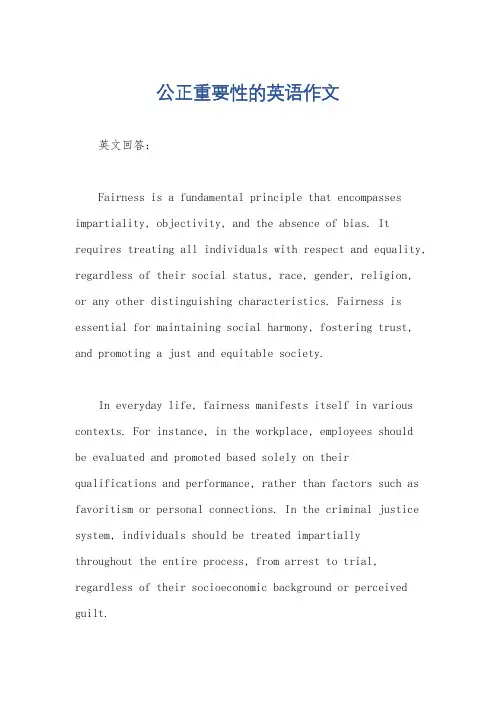
公正重要性的英语作文英文回答:Fairness is a fundamental principle that encompasses impartiality, objectivity, and the absence of bias. It requires treating all individuals with respect and equality, regardless of their social status, race, gender, religion,or any other distinguishing characteristics. Fairness is essential for maintaining social harmony, fostering trust, and promoting a just and equitable society.In everyday life, fairness manifests itself in various contexts. For instance, in the workplace, employees should be evaluated and promoted based solely on theirqualifications and performance, rather than factors such as favoritism or personal connections. In the criminal justice system, individuals should be treated impartiallythroughout the entire process, from arrest to trial, regardless of their socioeconomic background or perceived guilt.On a broader scale, fairness is crucial for maintaining a healthy democracy. All citizens should have an equal opportunity to vote and participate in the political process, regardless of their political beliefs or social standing. Governments should strive to implement policies that benefit all members of society, not just a privileged few.Moreover, fairness is vital for international relations. Countries should cooperate on the basis of mutual respect and shared goals, rather than resorting to aggression or exploitation. The pursuit of fairness can promote peace and stability, and help to resolve conflicts through peaceful negotiations.In conclusion, fairness is a cornerstone of a just and equitable society. It ensures that all individuals are treated with respect and dignity, fostering a harmoniousand trusting environment. By embracing fairness, we can create a world where everyone has the opportunity to succeed and contribute to the betterment of society.中文回答:公平的重要性。
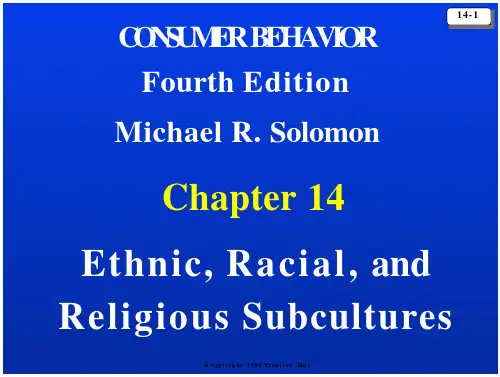

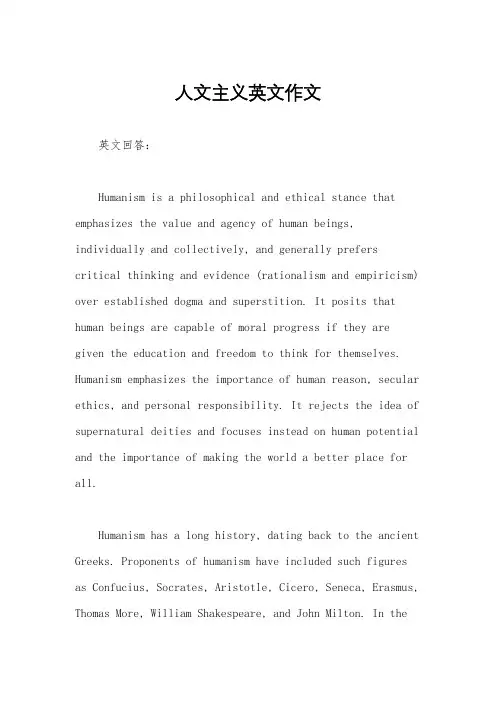
人文主义英文作文英文回答:Humanism is a philosophical and ethical stance that emphasizes the value and agency of human beings, individually and collectively, and generally preferscritical thinking and evidence (rationalism and empiricism) over established dogma and superstition. It posits that human beings are capable of moral progress if they are given the education and freedom to think for themselves. Humanism emphasizes the importance of human reason, secular ethics, and personal responsibility. It rejects the idea of supernatural deities and focuses instead on human potential and the importance of making the world a better place for all.Humanism has a long history, dating back to the ancient Greeks. Proponents of humanism have included such figures as Confucius, Socrates, Aristotle, Cicero, Seneca, Erasmus, Thomas More, William Shakespeare, and John Milton. In the19th century, humanism was revived as a secular alternative to traditional religious beliefs. Humanism today is a diverse movement with a wide range of beliefs and practices. However, all humanists share a commitment to the values of reason, compassion, and human dignity.Humanism has been criticized by some for being too focused on human potential and not enough on the importance of tradition and religion. Others have argued that humanism is too individualistic and does not sufficiently emphasize the importance of community. However, humanism continues to be a popular philosophy, particularly among those who are seeking a secular alternative to traditional religious beliefs.中文回答:人文主义是一种哲学和伦理立场,强调人类的价值和能动性,无论是个体还是集体,并且通常更喜欢批判性思维和证据(理性主义和经验主义)而不是既定的教条和迷信。
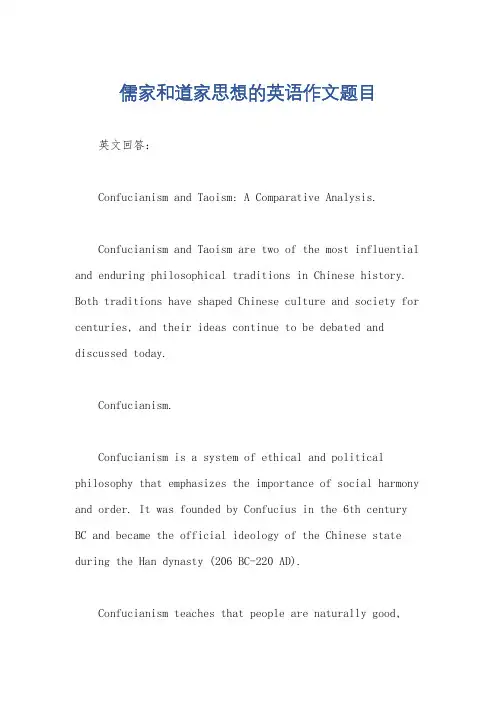
儒家和道家思想的英语作文题目英文回答:Confucianism and Taoism: A Comparative Analysis.Confucianism and Taoism are two of the most influential and enduring philosophical traditions in Chinese history. Both traditions have shaped Chinese culture and society for centuries, and their ideas continue to be debated and discussed today.Confucianism.Confucianism is a system of ethical and political philosophy that emphasizes the importance of social harmony and order. It was founded by Confucius in the 6th century BC and became the official ideology of the Chinese state during the Han dynasty (206 BC-220 AD).Confucianism teaches that people are naturally good,but that they need to be taught proper moral conduct. The goal of Confucianism is to create a harmonious society in which everyone knows their place and fulfills their duties.Key Confucian Concepts:Ren (benevolence): The central virtue in Confucianism, ren is a kind of universal love and compassion.Li (ritual): Proper social conduct is essential for maintaining harmony and order.Xiao (filial piety): Respect for one's parents and ancestors is a fundamental duty.Zhong (loyalty): Loyalty to one's superiors is essential for a stable society.Yi (righteousness): Acting in accordance with moral principles is essential for a good life.Taoism.Taoism is a philosophical and religious tradition that emphasizes the importance of living in harmony with the natural world. It was founded by Lao Tzu in the 6th century BC and has been a major influence on Chinese culture ever since.Taoism teaches that the Tao, or "Way," is the ultimate reality. The Tao is a force that is both immanent and transcendent, and it is the source of all life. The goal of Taoism is to live in harmony with the Tao by following the natural flow of things.Key Taoist Concepts:Wu wei (non-action): The best way to live in harmony with the Tao is to follow the natural flow of things and avoid interfering with it.Ziran (nature): The natural world is a source of wisdom and harmony.Pu (emptiness): The emptiness of the Tao is a source of creativity and possibility.Yin and yang: The complementary forces of yin (female) and yang (male) are essential for harmony and balance.De (virtue): The highest virtue is to live in harmony with the Tao.Comparison of Confucianism and Taoism.Confucianism and Taoism are two very different philosophical traditions, but they also share some important similarities. Both traditions emphasize the importance of living a harmonious life, and both traditions see the natural world as a source of wisdom.However, there are also some key differences between the two traditions. Confucianism focuses on the importance of social order and hierarchy, while Taoism emphasizes the importance of living in harmony with nature. Confucianism also sees human nature as fundamentally good, while Taoismsees human nature as both good and evil.Conclusion.Confucianism and Taoism are two of the most important philosophical traditions in Chinese history. Both traditions have shaped Chinese culture and society for centuries, and their ideas continue to be debated and discussed today. The comparison of Confucianism and Taoism reveals the diversity and depth of Chinese philosophy.中文回答:儒家思想与道家思想比较。
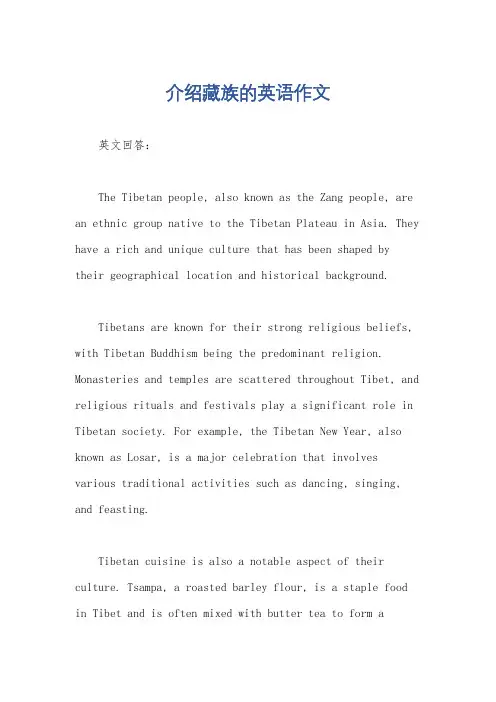
介绍藏族的英语作文英文回答:The Tibetan people, also known as the Zang people, are an ethnic group native to the Tibetan Plateau in Asia. They have a rich and unique culture that has been shaped bytheir geographical location and historical background.Tibetans are known for their strong religious beliefs, with Tibetan Buddhism being the predominant religion. Monasteries and temples are scattered throughout Tibet, and religious rituals and festivals play a significant role in Tibetan society. For example, the Tibetan New Year, also known as Losar, is a major celebration that involves various traditional activities such as dancing, singing, and feasting.Tibetan cuisine is also a notable aspect of their culture. Tsampa, a roasted barley flour, is a staple food in Tibet and is often mixed with butter tea to form adough-like consistency. Yak meat and dairy products are commonly consumed, reflecting the importance of yak husbandry in Tibetan nomadic life.The Tibetan language is another key element of Tibetan culture. It belongs to the Tibetic language family and has several dialects. Tibetan script, which is derived from the ancient Brahmi script, is used for writing. However, due to the influence of the Chinese government, Mandarin Chinese has also become widely spoken in Tibet.Tibetan traditional clothing is distinctive and colorful. Both men and women wear long-sleeved robes called chubas, which are usually made of wool. The chubas are often adorned with intricate patterns and designs, reflecting the artistic skills of the Tibetan people.Tibetan art and crafts are highly regarded for their intricate designs and vibrant colors. Thangka paintings, which depict Buddhist deities and scenes, are a prominent form of Tibetan art. Tibetan carpets, jewelry, and pottery are also well-known for their craftsmanship.Despite their unique cultural heritage, Tibetans have faced challenges in preserving their traditions and way of life. The Chinese government's policies and restrictions have had a significant impact on Tibetan culture and haveled to concerns about the erosion of Tibetan identity.In conclusion, the Tibetan people have a rich anddistinct culture that encompasses religion, cuisine, language, clothing, art, and crafts. Their traditions and way of life are deeply rooted in their history and geographical location. However, the preservation of Tibetan culture remains a challenge in the face of external influences.中文回答:藏族人民,也被称为藏人,是亚洲藏高原的本土民族。
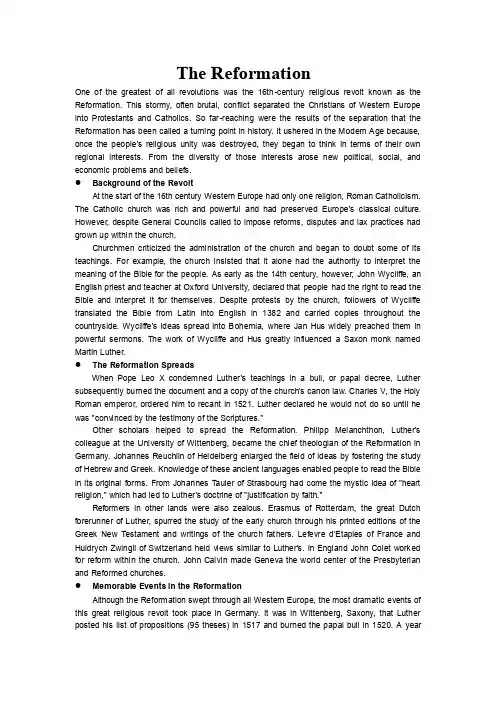
The ReformationOne of the greatest of all revolutions was the 16th-century religious revolt known as the Reformation. This stormy, often brutal, conflict separated the Christians of Western Europe into Protestants and Catholics. So far-reaching were the results of the separation that the Reformation has been called a turning point in history. It ushered in the Modern Age because, once the people's religious unity was destroyed, they began to think in terms of their own regional interests. From the diversity of those interests arose new political, social, and economic problems and beliefs.●Background of the RevoltAt the start of the 16th century Western Europe had only one religion, Roman Catholicism. The Catholic church was rich and powerful and had preserved Europe's classical culture. However, despite General Councils called to impose reforms, disputes and lax practices had grown up within the church.Churchmen criticized the administration of the church and began to doubt some of its teachings. For example, the church insisted that it alone had the authority to interpret the meaning of the Bible for the people. As early as the 14th century, however, John Wycliffe, an English priest and teacher at Oxford University, declared that people had the right to read the Bible and interpret it for themselves. Despite protests by the church, followers of Wycliffe translated the Bible from Latin into English in 1382 and carried copies throughout the countryside. Wycliffe's ideas spread into Bohemia, where Jan Hus widely preached them in powerful sermons. The work of Wycliffe and Hus greatly influenced a Saxon monk named Martin Luther.●The Reformation SpreadsWhen Pope Leo X condemned Luther's teachings in a bull, or papal decree, Luther subsequently burned the document and a copy of the church's canon law. Charles V, the Holy Roman emperor, ordered him to recant in 1521. Luther declared he would not do so until he was "convinced by the testimony of the Scriptures."Other scholars helped to spread the Reformation. Philipp Melanchthon, Luther's colleague at the University of Wittenberg, became the chief theologian of the Reformation in Germany. Johannes Reuchlin of Heidelberg enlarged the field of ideas by fostering the study of Hebrew and Greek. Knowledge of these ancient languages enabled people to read the Bible in its original forms. From Johannes T auler of Strasbourg had come the mystic idea of "heart religion," which had led to Luther's doctrine of "justification by faith."Reformers in other lands were also zealous. Erasmus of Rotterdam, the great Dutch forerunner of Luther, spurred the study of the early church through his printed editions of the Greek New Testament and writings of the church fathers. Lefevre d'Etaples of France and Huldrych Zwingli of Switzerland held views similar to Luther's. In England John Colet worked for reform within the church. John Calvin made Geneva the world center of the Presbyterian and Reformed churches.●Memorable Events in the ReformationAlthough the Reformation swept through all Western Europe, the most dramatic events of this great religious revolt took place in Germany. It was in Wittenberg, Saxony, that Luther posted his list of propositions (95 theses) in 1517 and burned the papal bull in 1520. A yearlater he was condemned by the Diet of Worms. In 1525 German nobles, encouraged by Luther, put down the Peasants' Revolt.Another great event in the Reformation occurred in 1529, when the word Protestant was first used formally. In Germany the Diet of Speyer decreed that changes of religion must stop and that the authority of the Catholic church be restored. The Lutheran minority in the Diet signed a protest against that decree, however. From this protest comes the modern term for the religious denominations of Protestantism .The fury and suffering of war added to the turmoil of the Reformation through the end of the Thirty Years' War in 1648. Time and again Charles V fought to uphold the Holy Roman Empire and the Catholic church against the claims of France and the German princes. But he needed their aid as he battled the Muslims who had advanced to the doors of Germany. Then he fought the Schmalkaldic War (1546-47). Although he defeated the Protestants, he could not turn back the movement of the Reformation.Peace treaties, however, followed the religious wars. The most important of these was the Peace of Augsburg in 1555. By that treaty Charles V was at last forced to grant to the ruler of each German state the right to choose Catholicism or Lutheranism. The state's religion was still imposed by the ruler, but the treaty gave a temporary religious peace to Germany.The Lutheran faith spread chiefly in northern Germany and in Scandinavia. The Swiss were influenced early by Huldrych Zwingli, but like the French and Dutch they drew their Protestantism from a movement led by John Calvin a generation later. From this grew the zealous work of John Knox, who brought Presbyterianism to Scotland. The English Reformation began in 1533 when Henry VIII broke with the pope, who had refused to annul Henry's marriage to Catherine of Aragon. The introduction of Protestant doctrine in the Church of England, however, did not take place until 1549, during the reign of Edward VI.The Catholic Counter-ReformationCatholic church authorities underestimated the extent of the Reformation at first, considering it just another dissension or schism. Soon, however, they saw the movement spreading from one country to another.The church took action. From 1545 to 1563 the Council of Trent issued decrees to correct abuses and to reaffirm ancient doctrines and traditions. The most vigorous program was set up by the Society of Jesus, commonly called the Jesuits. This order was started in 1534 by Ignatius of Loyola, a Spanish nobleman and soldier who had become a monk. The Jesuit order was sanctioned by the pope in 1540.A succession of able popes during the latter half of the 16th century followed the policy set in the Counter-Reformation. Their conscientious administrations removed much of the incentive to revolt.By the close of the 16th century the Roman Catholic church had regained the faith of the people in half of the lands it had lost to Protestantism. Europe was then divided between the two forms of Christianity along almost the same lines that exist today.尹训然2010115069。
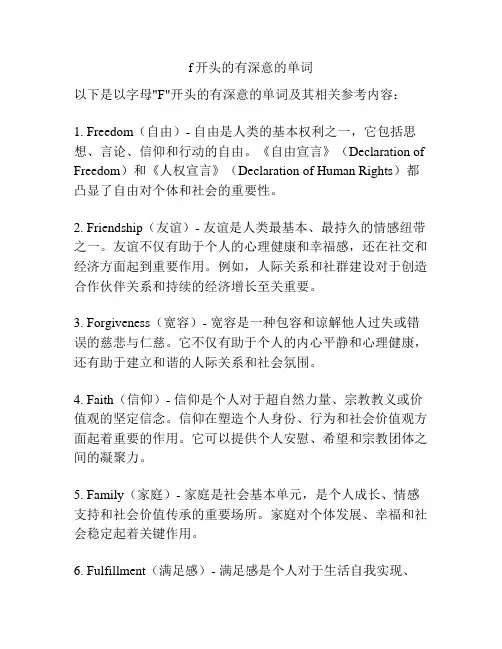
f开头的有深意的单词以下是以字母"F"开头的有深意的单词及其相关参考内容:1. Freedom(自由)- 自由是人类的基本权利之一,它包括思想、言论、信仰和行动的自由。
《自由宣言》(Declaration of Freedom)和《人权宣言》(Declaration of Human Rights)都凸显了自由对个体和社会的重要性。
2. Friendship(友谊)- 友谊是人类最基本、最持久的情感纽带之一。
友谊不仅有助于个人的心理健康和幸福感,还在社交和经济方面起到重要作用。
例如,人际关系和社群建设对于创造合作伙伴关系和持续的经济增长至关重要。
3. Forgiveness(宽容)- 宽容是一种包容和谅解他人过失或错误的慈悲与仁慈。
它不仅有助于个人的内心平静和心理健康,还有助于建立和谐的人际关系和社会氛围。
4. Faith(信仰)- 信仰是个人对于超自然力量、宗教教义或价值观的坚定信念。
信仰在塑造个人身份、行为和社会价值观方面起着重要的作用。
它可以提供个人安慰、希望和宗教团体之间的凝聚力。
5. Family(家庭)- 家庭是社会基本单元,是个人成长、情感支持和社会价值传承的重要场所。
家庭对个体发展、幸福和社会稳定起着关键作用。
6. Fulfillment(满足感)- 满足感是个人对于生活自我实现、目标达成和幸福感的体验。
追求满足感是激励个人成长与发展的重要动力。
7. Equality(平等)- 平等是每个人都享有公平待遇和机会的权利。
追求平等有助于消除歧视、促进社会正义和提升整体社会福利。
8. Empowerment(授权)- 授权是给予个体或群体权力和能力,使其能够主动参与决策和实现目标。
个体的授权有助于提高自尊和自信,促进个人和社会的发展。
9. Environmentalism(环保主义)- 环保主义强调保护和维护自然环境的重要性,以保护地球资源和生态平衡。
环保主义倡导可持续发展和对人类社会的长期利益的关注。
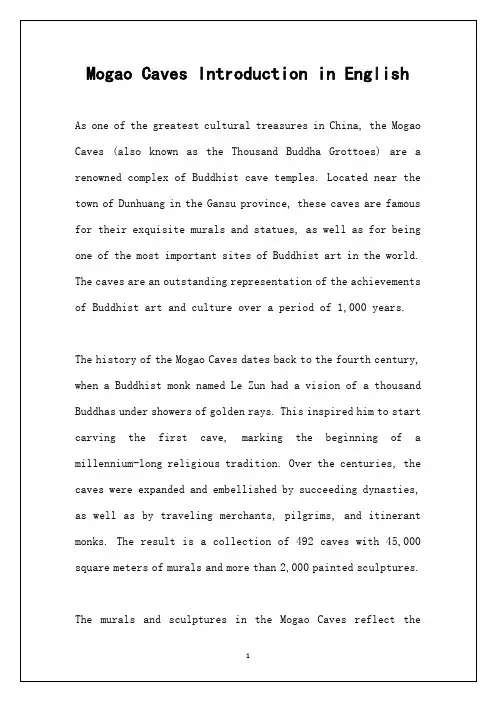
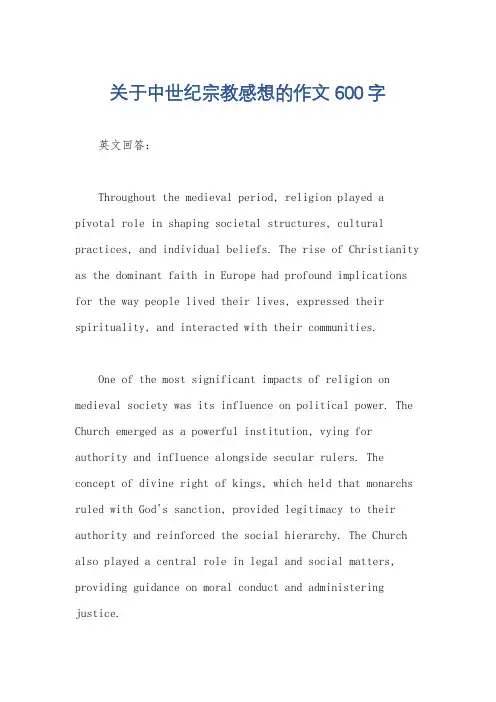
关于中世纪宗教感想的作文600字英文回答:Throughout the medieval period, religion played a pivotal role in shaping societal structures, cultural practices, and individual beliefs. The rise of Christianity as the dominant faith in Europe had profound implications for the way people lived their lives, expressed their spirituality, and interacted with their communities.One of the most significant impacts of religion on medieval society was its influence on political power. The Church emerged as a powerful institution, vying for authority and influence alongside secular rulers. The concept of divine right of kings, which held that monarchs ruled with God's sanction, provided legitimacy to their authority and reinforced the social hierarchy. The Church also played a central role in legal and social matters, providing guidance on moral conduct and administering justice.Religion also had a profound influence on cultural practices and artistic expression. Cathedrals and other religious buildings were architectural marvels, showcasing the skill and devotion of medieval craftsmen. Religious themes dominated art and literature, from illuminated manuscripts to stained-glass windows to epic poems. Music also played an important role in religious life, with elaborate choral works and polyphonic arrangements enhancing worship and celebration.Furthermore, religion shaped individual beliefs and practices. People embraced the teachings of Christianity, seeking salvation through faith and adherence to religious doctrines. Monasticism, the practice of withdrawing from the world to pursue a spiritual life, flourished during the Middle Ages. Pilgrims embarked on arduous journeys to holy sites, hoping to gain spiritual merit and divine favor.However, the influence of religion in medieval society was not without its complexities. The Church also faced criticism and challenges, particularly during periods ofpolitical or social upheaval. Heresies and schisms arose, challenging the Church's authority and leading to persecution and divisions. Additionally, the Church's wealth and power sometimes led to corruption and abuses, tarnishing its reputation.中文回答:中世纪时期,宗教在塑造社会结构、文化习俗和个人信仰方面发挥着至关重要的作用。

宗教禁忌英文作文Religious taboos vary across different cultures and religions. They are deeply rooted in traditions and beliefs, and breaking them can have serious consequences. Here are some examples of religious taboos:1. Eating pork: In some religions, such as Islam and Judaism, consuming pork is strictly forbidden. It is considered unclean and impure. The mere act of eating pork can be seen as a violation of religious laws.2. Idol worship: Many religions prohibit the worship of idols or images. This is because they believe in theworship of a single, invisible deity. Any form of idol worship is seen as a betrayal of the true faith.3. Blasphemy: Speaking or acting disrespectfullytowards religious figures or beliefs is considered a tabooin many religions. It is seen as an offense against the divine and can lead to severe social and religiousconsequences.4. Divorce: In some religious communities, divorce is strongly discouraged or even forbidden. The belief is that marriage is a sacred bond that should not be broken, and divorce is seen as a failure to uphold this commitment.5. Cursing or using offensive language: Many religions emphasize the importance of using respectful and polite language. The use of curse words or offensive language is seen as disrespectful and can be considered a taboo.6. Interfaith marriage: Some religions discourage or prohibit interfaith marriages. The belief is that marriage should be between individuals who share the same religious beliefs and values.7. Desecration of sacred places: Sacred places, such as temples, churches, or mosques, are considered holy and should be treated with reverence. Any act of desecration or disrespect towards these places is seen as a taboo.8. Working on the Sabbath: In some religions, observinga day of rest, such as the Sabbath, is considered areligious duty. Working on this day is seen as a violationof religious laws and is therefore forbidden.9. Breaking dietary restrictions: Many religions have specific dietary restrictions, such as vegetarianism or fasting. Breaking these restrictions is seen as a violation of religious laws and can be considered a taboo.10. Witchcraft or sorcery: In many religious traditions, practicing witchcraft or sorcery is considered taboo. It is seen as a form of black magic or manipulation of supernatural forces, which goes against religious teachings.These are just a few examples of religious taboos. It's important to respect and understand different religious beliefs and practices, even if they may seem strange or unfamiliar to us.。
思想独立的重要性英语作文150字英文回答:The significance of intellectual independence can't be overstated in contemporary society. It grants individuals the capacity to think critically, question prevailing norms, and cultivate their unique perspectives. Intellectual independence empowers people to navigate an increasingly complex world marked by misinformation and propaganda.In a society where conformity is often rewarded, intellectual independence can be seen as a form of rebellion. It challenges established authority and encourages individuals to forge their own paths. Those with intellectual independence are less likely to be swayed by popular opinion or fall prey to manipulation.Intellectual independence is not limited to academic pursuits. It extends to all aspects of life, including politics, religion, and personal values. Independentthinkers are willing to examine their beliefs and consider alternative viewpoints. They recognize that knowledge is constantly evolving and that their perspective is but oneof many.中文回答:思想独立的重要性在当代社会中有着不可忽视的地位。
The Importance of Religion
Religion exists for a long time in the human society . The study of archaeology show that since there is country , there is religion . Wang Zhicheng have said that the truth of religion lies not in its external economic strength but in its in-depth perception of the world and its ability of lead people to attain the consciousness of life . I quite agree with his comments . I think we need religion , because it has a great influence on the individual , the society and the world.
I am not a religious , but I do admire my religious friends . They have
a positive and serious attitude toward life and live . And the influence of religious involves all aspects of life . For example , Jewish life values is not only reflected in achieving spiritual perfection through practice the religious behavior , but also putting emphasis on the cultural education and through continuous learning to close to the god . Proverbs say that upbringing of children , in the way he should go , he will never turn from it even he is old . These kind of teaching which Judaism attach great importance to the education have great influence continuing today . Many successful people such as the world famous writer , philosopher and wealthy business man are coming from the Jews . Like “the greatest philosophers in Jewish tradition ”Mose Maimonides , the world renowned violinist Menuhin ,the founder of the psychoanalysis school
Freud . The Jews have made these achievements are inseparable with their Jewish nurture . In many centuries of the Jewish Diaspora history , Judaism is Jewish Human life and the pursuit of spiritual sustenance and penetrate in the social and political , all areas of the economy , culture , customs , etiquette , etc . And in the Christian Jesus , it has called on people to have a noble soul ,to love and tolerate others and pay attention to pure soul and so on .
In a word , the influence of religion on the outlook on life and values is far-reaching ,small to determine a person’s moral character ,marriage life ,interpersonal relationship , then to form a national characteristics and traditional culture .
Religion is not just about people’s spiritual world , it also contribute to the society and science . Such as Buddhism , we can not say that Buddhism is a science , but I think it contains some science . Buddhism have some contributions in physics , chemistry , biology , astronomy and medicine . Especially in medicine , Buddhism relatively has the most abundant content and the most complete system , it includes basic theory , clinical trials , medicine and health care , child care and many other aspects .
But religion also has their bad influence . Nowadays , some people use of religious differences inciting racial hatred , stirring up so-called Civilization Conflict . Even some people be ripoff to split the motherland
under the signboard of religion ! So the world should stick up for the purity of religion . Because of the importance of religion , we must raise the peace flags to oppose the use of religion to engage in undesirable activities , promote religious tolerance and reconciliation , create an environment of world peace !。